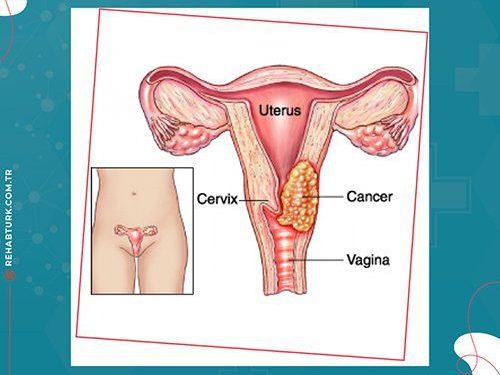Vaginal cancer treatment in Türkiye
Vaginal cancer
Vaginal cancer is a rare type of cancer that begins in the vagina. There are several main types of vaginal cancer including:
- Squamous cell : This type of cancer begins in the lining of the vagina and develops slowly and is responsible for about 75% of vaginal cancers.
- Adenocarcinoma : This type of cancer begins in the cells of the vaginal glands, and is most common in women over the age of fifty. It is the second most common type of vaginal cancer of all ages.
- Melanoma : This type of cancer begins in the cells that give color to the skin.
- Sarcoma : This type of cancer represents only about 4% of vaginal cancers and begins in the walls of the vagina.
The cure rate is high in the early stages of vaginal cancer.

Symptoms of vaginal cancer
The most common symptom of vaginal cancer is abnormal vaginal bleeding. This includes postmenopausal bleeding during or after sex and bleeding between periods.
- Watery vaginal secretions
- Painful or frequent urination
- Pelvic pain, especially during sex
- Fistulas in a later stage of cancer
In some cases, no symptoms appear and in these cases it may be discovered during a routine pelvic exam.
Causes and risk factors for vaginal cancer
Causes of injury include:
- Human papilloma virus This sexually transmitted infection is the most common cause of vaginal cancer.
- Previous cervical cancer: HPV often causes cervical cancer as well.
- Intrauterine exposure to diethylstilbestrol: This drug is used by pregnant women to prevent miscarriage. However, doctors stopped prescribing it in the 1970s.
Injury risk factors include:
- Smoking: which doubles the risk of infection
- Married persons over the age of 60
- HIV infection
- Early exposure to human papilloma virus through sexual activity
Diagnosis of vaginal cancer
First, the doctor reviews the patient’s medical report to learn more about possible symptoms and risk factors. He then performs a pelvic exam to look for possible causes of the symptoms and also performs a Pap smear to check for any abnormal cells in the vaginal area.
If the Pap smear shows any abnormal cells, the doctor will perform a colposcopy. This is a procedure in which the doctor uses a magnifying instrument called a colposcope to examine the walls of the vagina and cervix for the location of abnormal cells. This procedure is similar to a regular pelvic exam.
Once the doctor knows where the abnormal cells are, he or she will take a biopsy to see if the cells are cancerous.
If the cells are cancerous, the doctor will likely do an MRI or positron emission tomography (PET) scan to see if the cancer has spread to other parts of the body.
Cancer stages:
The stages of vaginal cancer tell you how far it has spread and there are four main stages plus one noncancerous stage
- Vaginal intraepithelial neoplasia (the inner lining of the vagina) is a type of possible cancer. There are abnormal cells in the lining of the vagina, but they do not grow or spread and are not cancerous yet.
- Stage 1 cancer is found only in the vaginal wall.
- Stage 2: The cancer has spread to the tissues surrounding the vagina but has not yet spread to the pelvic wall.
- Stage 3 is most common in the pelvis and pelvic wall and may also spread to nearby lymph nodes.
- Phase 4 The phase is divided into two sub-stations:
- A- The spread of cancer in the bladder, rectum, or both
- B- The cancer has spread further throughout the body to organs such as the lungs, liver, or distant lymph nodes
Treatment:
If the cancer is in the first stage and in the upper third of the vagina, the patient may undergo surgery to remove the tumor and a small area of healthy tissue around it, usually followed by radiation therapy.
Radiotherapy is the most widely used treatment in all stages. In some cases, the patient may be treated with chemotherapy to support radiotherapy, but there is little evidence that chemotherapy is beneficial .
If the patient has already received radiation therapy to the vaginal area, his doctor will likely recommend surgery because each part of the body can only receive a certain amount of radiation depending on the location of the tumor. The doctor may remove:
- The affected tumor and a small area of healthy tissue around it
- Part or all of the vagina
- Most of the genitals or pelvis
Stage 4b cancer is generally not curable but treatment can relieve symptoms. If this is the case, your doctor may recommend radiation therapy or chemotherapy and it may also be possible to enroll in a clinical trial to help test new treatments.
Outlook for people with vaginal cancer
In general, cancer societies estimate the five-year survival rate to be 47%. Survival rates vary greatly by stage. For stage I cancers, the five-year survival rate is 75%. The rates also depend on how far and where the cancer has spread.
Some other factors can also affect the survival rate. For example, women over 60 have lower survival rates.
Methods of prevention:
Although no one can completely reduce your risk of infection, there are steps you can take to reduce your risk, including:
- Take steps to reduce your risk of contracting HPV, including using condoms when having any kind of sex. And get the HPV vaccine
- Smoking is the main risk factor for vaginal cancer and other types of cancer
- Excessive alcohol intake increases the risk of infection
- Regular pelvic exams and Pap smears, which can help the doctor find cancers before they turn into vaginal cancers or catch vaginal cancer early, before it spreads or causes serious symptoms.
How can I book for vaginal cancer treatment in Türkiye?

- Free medical support on the phone: You will have a dedicated representative for your health condition who is always ready to answer your questions.
- Free consultation with a specialist doctor: Your medical representative will consult with a number of doctors and hospitals to find the best possible treatments.
- Free travel visa arrangement: We will contact the embassy in your country to assist you in obtaining a visa to visit Türkiye.
- Free itinerary planning: We will create a schedule for your medical trip to Türkiye.
- Free translation of documents and reports: We will translate medical documents and reports into Turkish on your behalf.
- Free support and monitoring: We will monitor the stages of treatment and be by your side every step of the way.
- Free instant translation: We will be with you during the treatment stages to provide translation between you and the medical team.
- Free accommodation and transportation coordination: We will book accommodation for you and your companions in Türkiye, along with transportation services.
Contact REHABTÜRK doctors for more information about the procedure and to evaluate your medical condition.

